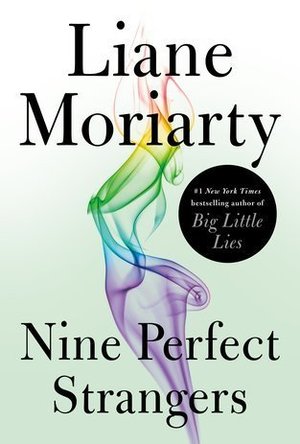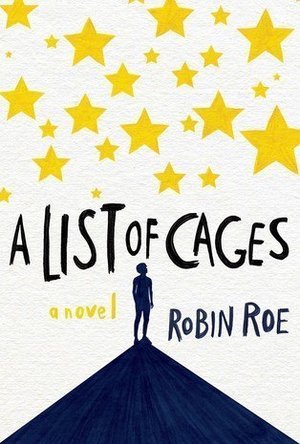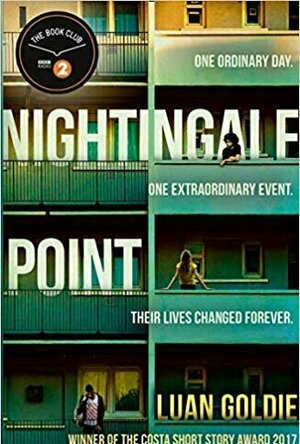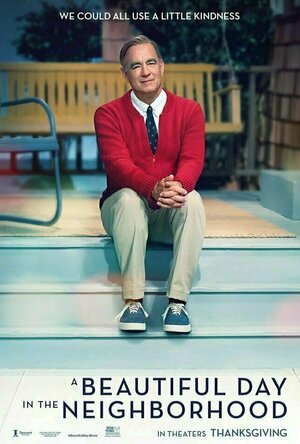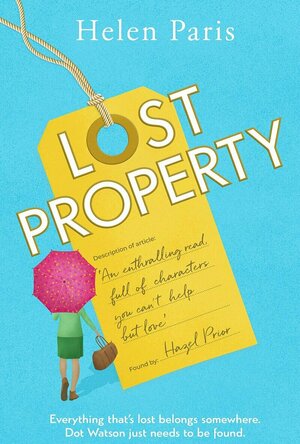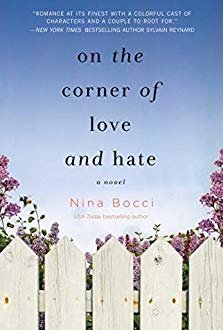Search
Search results
Midge (525 KP) rated Nine Perfect Strangers in Books
Jan 5, 2019
Laugh-out-loud funny (2 more)
Engaging characters
Great plot
My Rating is 9/10! ⭐⭐⭐⭐⭐⭐⭐⭐⭐
I love this book. It's a funny, entertaining, and imaginative book about the issues that affect many people from all walks of life. It's also a definite must-read for all Liane Moriarty fans out there.
Nine people, of all ages, have booked into a health resort called Tranquillum House for a break. They are all going there for their own reasons. Located in Australia, Tranquillum House is a "boutique health and wellness resort" where a new you awaits. The resort is owned and run by Masha, a ruthlessly ambitious Russian. She is a former company executive who, ten years prior, experienced a near-death experience leading to her to choose a different life direction. However, Masha, assisted by her loyal staff members, Yao and Delilah, has a dark and sinister agenda for her nine new customers, although she is driven by good intentions.
The guests get a lot more than they bargained for with their ten-day cleansing programme of diet, light exercise, therapy and spa treatments. First, we are introduced to Frances, a romance novel writer whose career has taken a nosedive. Then Tony, who is divorced and has recently lost his much-loved dog has booked into Tranquillum House for weight loss. Lars, a divorce lawyer, is a regular guest of health resorts. Ben and his wife Jessica have won millions on the lottery, but their marriage is in jeopardy. The Marconi family, Napoleon, a teacher, his wife, Heather and their daughter Zoe have booked in for stress relief and appear to be weighed down by grief and guilt. Carmel, a divorced mum of four girls, has lost her husband to a younger woman and is troubled by her very low self-esteem.
All of the characters are wonderfully developed and are all so hopeful for their stay at the health resort. Their interactions with each other are fabulously entertaining, particularly those including my two favourites, Frances and Yao. Frances, for me, was hilarious and I loved the portrayal of the obsessive and infatuated Yao. Masha, exotic, charismatic and narcissistic, has plans for all of the guests that she truly believes will transform their lives and will reward her a glorious and promising future.
Humour and wit in are both in abundance in this novel where people with little in common with each other come together in circumstances where they form unexpected bonds with one another. There are, however, some terribly sad experiences for some of them, including Masha, that eventually became apparent by the end. I did find the pacing a little slow at times but it picked up during a very suspenseful second half of the novel. I couldn't really guess how this book would end but I absolutely loved the way the story was concluded.
Whilst "Nine Perfect Strangers" might not be everyone's favourite novel by Liane Moriarty, including mine, (I think "Big Little Lies" is a better book), it was still a hugely enjoyable read. Overall, I would say that Liane Moriarty has created a book with engaging characters, a surprising plot and some very insightful writing, which I am extremely pleased I have read!
Nine people, of all ages, have booked into a health resort called Tranquillum House for a break. They are all going there for their own reasons. Located in Australia, Tranquillum House is a "boutique health and wellness resort" where a new you awaits. The resort is owned and run by Masha, a ruthlessly ambitious Russian. She is a former company executive who, ten years prior, experienced a near-death experience leading to her to choose a different life direction. However, Masha, assisted by her loyal staff members, Yao and Delilah, has a dark and sinister agenda for her nine new customers, although she is driven by good intentions.
The guests get a lot more than they bargained for with their ten-day cleansing programme of diet, light exercise, therapy and spa treatments. First, we are introduced to Frances, a romance novel writer whose career has taken a nosedive. Then Tony, who is divorced and has recently lost his much-loved dog has booked into Tranquillum House for weight loss. Lars, a divorce lawyer, is a regular guest of health resorts. Ben and his wife Jessica have won millions on the lottery, but their marriage is in jeopardy. The Marconi family, Napoleon, a teacher, his wife, Heather and their daughter Zoe have booked in for stress relief and appear to be weighed down by grief and guilt. Carmel, a divorced mum of four girls, has lost her husband to a younger woman and is troubled by her very low self-esteem.
All of the characters are wonderfully developed and are all so hopeful for their stay at the health resort. Their interactions with each other are fabulously entertaining, particularly those including my two favourites, Frances and Yao. Frances, for me, was hilarious and I loved the portrayal of the obsessive and infatuated Yao. Masha, exotic, charismatic and narcissistic, has plans for all of the guests that she truly believes will transform their lives and will reward her a glorious and promising future.
Humour and wit in are both in abundance in this novel where people with little in common with each other come together in circumstances where they form unexpected bonds with one another. There are, however, some terribly sad experiences for some of them, including Masha, that eventually became apparent by the end. I did find the pacing a little slow at times but it picked up during a very suspenseful second half of the novel. I couldn't really guess how this book would end but I absolutely loved the way the story was concluded.
Whilst "Nine Perfect Strangers" might not be everyone's favourite novel by Liane Moriarty, including mine, (I think "Big Little Lies" is a better book), it was still a hugely enjoyable read. Overall, I would say that Liane Moriarty has created a book with engaging characters, a surprising plot and some very insightful writing, which I am extremely pleased I have read!
Hazel (1853 KP) rated A List of Cages in Books
Dec 17, 2018
<i>This ARC was provided by the author in exchange for an honest review </i>
Debut novelist Robin Roe is emerging with a bang with soon-to-be-published young adult novel, <i>A List of Cages</i>. Dealing with relatable school experience as well as devastating, painful realities, Roe engages the reader in a gripping, heartbreaking narrative.
Told through the words of two characters, <i>A List of Cages</i> explores contrasting personalities of high school students. On the one hand there is Julian, a quiet, anxious 14-year-old who is often ostracized and ridiculed by the members of his classes. Suffering from dyslexia, Julian does not enjoy school or have any friends to talk to. To make things worse, his parents have died, leaving Julian in the care of irascible Uncle Russell. In contrast, Adam, a senior, is a popular, well-loved student, whose diagnosis of ADHD causes him to be loud and energetic – the opposite of fearful Julian.
Having known Julian before the death of his parents, Adam is quick to notice the change in Julian’s personality and uses his role as aide to the school psychologist to get to know him better. Much to his friends’ unease, Adam begins bringing Julian along to parties, concerts and days out where, despite initially sticking out like a sore thumb, Julian begins to relax and realize that people enjoy having him around. Yet, Adam is still acutely aware that something is not right, and although suspicious of Julian’s uncle, does not do anything until it is almost too late…
For a fairly short story, <i>A List of Cages</i> covers a broad range of themes. Many of these are comparisons that reveal the potential problems students may face during high school. The obvious issue of learning difficulties are highlighted by Adam’s ADHD and Julian’s Dyslexia, as well as the contrasting ways teachers deal with them. There is also the difference in personality that alters the way the characters are received by their peers.
A prominent theme is grief – coming to terms with the sudden deaths of parents; but the most important subject raised is the advantage an ignoble adult may take on a vulnerable child. The abuse inflicted on Julian is demoralizing and painful to read - the understanding that this is a real issue in today’s world, shatteringly upsetting. The ease with which an abuser controls their victim is extremely scary, however the knowledge that there are people around to help and/or rescue the child is uplifting.
<i>A List of Cages</i> has been listed as suitable for readers between the ages of 12 and 18, however I disagree. The distressing storyline will most likely upset the lower end of this scale, especially as at that age they may not be able to fully understand the circumstances described. The occasional use of expletives support my opinion that older readers are the more appropriate audience.
It may take a few chapters to get a feel for the book, however <i>A List of Cages</i> is a highly recommended novel. Many writers over the past decade have brought topics previously taboo to readers’ attentions. Robin Roe continues to create an awareness of such matters through her incisive story. Her writing style will appeal to many well-read teenagers, and it is hoped that she will continue publishing works in this vein.
Debut novelist Robin Roe is emerging with a bang with soon-to-be-published young adult novel, <i>A List of Cages</i>. Dealing with relatable school experience as well as devastating, painful realities, Roe engages the reader in a gripping, heartbreaking narrative.
Told through the words of two characters, <i>A List of Cages</i> explores contrasting personalities of high school students. On the one hand there is Julian, a quiet, anxious 14-year-old who is often ostracized and ridiculed by the members of his classes. Suffering from dyslexia, Julian does not enjoy school or have any friends to talk to. To make things worse, his parents have died, leaving Julian in the care of irascible Uncle Russell. In contrast, Adam, a senior, is a popular, well-loved student, whose diagnosis of ADHD causes him to be loud and energetic – the opposite of fearful Julian.
Having known Julian before the death of his parents, Adam is quick to notice the change in Julian’s personality and uses his role as aide to the school psychologist to get to know him better. Much to his friends’ unease, Adam begins bringing Julian along to parties, concerts and days out where, despite initially sticking out like a sore thumb, Julian begins to relax and realize that people enjoy having him around. Yet, Adam is still acutely aware that something is not right, and although suspicious of Julian’s uncle, does not do anything until it is almost too late…
For a fairly short story, <i>A List of Cages</i> covers a broad range of themes. Many of these are comparisons that reveal the potential problems students may face during high school. The obvious issue of learning difficulties are highlighted by Adam’s ADHD and Julian’s Dyslexia, as well as the contrasting ways teachers deal with them. There is also the difference in personality that alters the way the characters are received by their peers.
A prominent theme is grief – coming to terms with the sudden deaths of parents; but the most important subject raised is the advantage an ignoble adult may take on a vulnerable child. The abuse inflicted on Julian is demoralizing and painful to read - the understanding that this is a real issue in today’s world, shatteringly upsetting. The ease with which an abuser controls their victim is extremely scary, however the knowledge that there are people around to help and/or rescue the child is uplifting.
<i>A List of Cages</i> has been listed as suitable for readers between the ages of 12 and 18, however I disagree. The distressing storyline will most likely upset the lower end of this scale, especially as at that age they may not be able to fully understand the circumstances described. The occasional use of expletives support my opinion that older readers are the more appropriate audience.
It may take a few chapters to get a feel for the book, however <i>A List of Cages</i> is a highly recommended novel. Many writers over the past decade have brought topics previously taboo to readers’ attentions. Robin Roe continues to create an awareness of such matters through her incisive story. Her writing style will appeal to many well-read teenagers, and it is hoped that she will continue publishing works in this vein.
Ivana A. | Diary of Difference (1171 KP) rated Nightingale Point in Books
Feb 3, 2020
<a href="https://diaryofdifference.com/">Blog</a>; | <a href="https://www.facebook.com/diaryofdifference/">Facebook</a>; | <a href="https://twitter.com/DiaryDifference">Twitter</a>; | <a href="https://www.instagram.com/diaryofdifference/">Instagram</a>; | <a href="https://www.pinterest.co.uk/diaryofdifference/pins/">Pinterest</a>;
<img src="https://diaryofdifference.com/wp-content/uploads/2019/07/Book-Review-Banner.png"/>;
<b><i>One ordinary day. One extraordinary event. Their lives changed forever. </i></b>
Nightingale Point is a book that shows the aftermath of a terrible disaster. A story about many people's lives, how this event changed them and their recovery and grief.
<b><i>BEFORE</i></b>
The book starts with giving us a brief description of people living in two neighboring buildings. We get to know their daily routines, their worries and hopes. We get a glimpse of their everyday lives and start to care for them.
We meet Mary, who has moved from the Philippines into the UK to persue her career as a nurse. Her husband is always away and her children are distant.
We meet the brothers Tristan and Malachi - they have a tragedy of their own, and Mary is like their mum. Tristan is the naughty 16-year-old and Malachi is the older, more responsible brother.
Then we meet Pamela, a 16-year-old who loves running and falls in love with Malachi. However, her racist dad forbids her to see Malachi and locks her inside the building,
We see Elvis as well, who has learning disabilities and lives with his carer. He gets bullied by Tristan one day when Tristan spits in his face.
<b><i>AFTER</i></b>
On 4th May 1996, a plane crashes into these two buildings at Nightingale Point and everything changes.
Every resident that lives on Nightingale Point has a before and after story. The ones that survived, but also the ones that didn't.
This is a story about how much one event can turn your life upside down, how it can change you and also how much little things mean in life, but we forget them so often.
I found it amusing that we had different chapters from different people's perspectives, and each character had its own different writing style and life to it. This was amazingly done by the author. I found the chapters with Elvis especially refreshing, as they were so heartwarming.
Based on real tragic events - the crash in Bijlmer, Amsterdam and also the fire in Grenfell Tower, the author did a wonderful job in showing the readers the true pain, trauma and the battle of moving forward when a tragedy happens.
Guys, if you haven't read this book, please pick it up. It will be a hit and it will change your life. Every time I look at this book, I will remember how much little things matter in life and will always call my dad and ask him how he's doing. Because it matters.
Thank you to the team at HQ for sending me a copy of this book in exchange for an honest review.
<a href="https://diaryofdifference.com/">Blog</a>; | <a href="https://www.facebook.com/diaryofdifference/">Facebook</a>; | <a href="https://twitter.com/DiaryDifference">Twitter</a>; | <a href="https://www.instagram.com/diaryofdifference/">Instagram</a>; | <a href="https://www.pinterest.co.uk/diaryofdifference/pins/">Pinterest</a>;
<img src="https://diaryofdifference.com/wp-content/uploads/2019/07/Book-Review-Banner.png"/>;
<b><i>One ordinary day. One extraordinary event. Their lives changed forever. </i></b>
Nightingale Point is a book that shows the aftermath of a terrible disaster. A story about many people's lives, how this event changed them and their recovery and grief.
<b><i>BEFORE</i></b>
The book starts with giving us a brief description of people living in two neighboring buildings. We get to know their daily routines, their worries and hopes. We get a glimpse of their everyday lives and start to care for them.
We meet Mary, who has moved from the Philippines into the UK to persue her career as a nurse. Her husband is always away and her children are distant.
We meet the brothers Tristan and Malachi - they have a tragedy of their own, and Mary is like their mum. Tristan is the naughty 16-year-old and Malachi is the older, more responsible brother.
Then we meet Pamela, a 16-year-old who loves running and falls in love with Malachi. However, her racist dad forbids her to see Malachi and locks her inside the building,
We see Elvis as well, who has learning disabilities and lives with his carer. He gets bullied by Tristan one day when Tristan spits in his face.
<b><i>AFTER</i></b>
On 4th May 1996, a plane crashes into these two buildings at Nightingale Point and everything changes.
Every resident that lives on Nightingale Point has a before and after story. The ones that survived, but also the ones that didn't.
This is a story about how much one event can turn your life upside down, how it can change you and also how much little things mean in life, but we forget them so often.
I found it amusing that we had different chapters from different people's perspectives, and each character had its own different writing style and life to it. This was amazingly done by the author. I found the chapters with Elvis especially refreshing, as they were so heartwarming.
Based on real tragic events - the crash in Bijlmer, Amsterdam and also the fire in Grenfell Tower, the author did a wonderful job in showing the readers the true pain, trauma and the battle of moving forward when a tragedy happens.
Guys, if you haven't read this book, please pick it up. It will be a hit and it will change your life. Every time I look at this book, I will remember how much little things matter in life and will always call my dad and ask him how he's doing. Because it matters.
Thank you to the team at HQ for sending me a copy of this book in exchange for an honest review.
<a href="https://diaryofdifference.com/">Blog</a>; | <a href="https://www.facebook.com/diaryofdifference/">Facebook</a>; | <a href="https://twitter.com/DiaryDifference">Twitter</a>; | <a href="https://www.instagram.com/diaryofdifference/">Instagram</a>; | <a href="https://www.pinterest.co.uk/diaryofdifference/pins/">Pinterest</a>;
Neon's Nerd Nexus (360 KP) rated A Beautiful Day in the Neighborhood (2019) in Movies
Feb 2, 2020 (Updated Feb 2, 2020)
Hello Neighbor
A Beautiful Day In The Neighborhood is an inspiring and delightful film about a man that was oh so smart and oh so pleasant. I just want to say from the start what an absolute joy this film was to watch, there was something so warm and wonderful there constantly that kept my full attention the entire time and when it ended I almost felt sad there wasnt more of it. Tom Hanks plays Fred Rogers aka Mr Rogers as hes known by most. An intriguing man who is almost investigated/interrogated by writer Lloyd Voge who has many troubles of his own. Hanks transforms seamlessly into Rogers with all his mannerisms replicated flawlessly even down to whats going on behined his eyes. Rogers may seem like theres something more sinister behined him at times but truth is he had a troubled past too and while maybe not a war veteran its almost as if you can see signs of depression or ptsd behined those eyes from the way he was treated in his youth of from the general weight of his job. But its the way the way hes learnt to deal with his anger, frustrations and demons thats so fascinating and how he manages to keep stong/humble so he can teach other children to overcome the harshness of life and the dark times they may face ahead of them thats trully inspiring and commendable. Llyods transformation during the film is also depicted amazingly too, hes so troubled hes almost beyond help, struggling with such emotions as grief, hatred and stress hes seemingly stuck on an ever declining path of sadness. That is until he meets rogers and the on screen interactions between these two are the absolute bread and butter to watch here as rogers uses his philosophy and good nature to help him find happiness in himself once again. See the thing is adults tend to dismiss anything they consider 'childish' but more often than not these so called childish things they dismiss contain more answers, escapism and advise for our problems than anything else be it by nostalgia, wisdom or philosophy or simple innocence. I loved how the tv show scenes felt so nostalgic that you could swear they were filmed way back in the past and the choice to use a different aspect ratio for them was smart. Its odd to say but theres definitely a subbtle element of horror and creepiness I found here too especially with some of the almost fever dream type scenes which worked extreamly well and broke up the film nicely. Lastly I would say if you are planning to see this be prepared to cry as its not only incredibly heartfelt it also constantly deals with very depressing subject matter too. So many times I found It depicted problems, situations, feelings and nostalgia to things that I have faced in my own life leading to me to tear up like it was speaking specifically to only me as I questioned my own life, feelings, relationships and decisions in my head. A splendid film that teaches us how life is to short to waste time on anger/hate and that we should instead spend and cherish the time we have here with the ones we love before its to late.
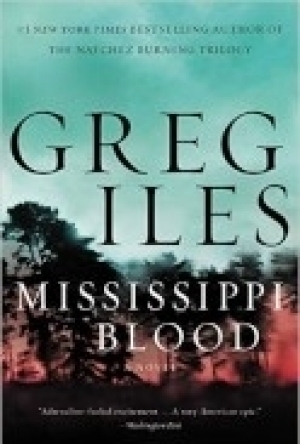
Mississippi Blood
Book
#1 New York Times Bestselling Author The endgame is at hand for Penn Cage, his family, and the...
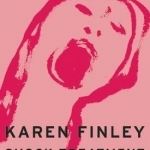
Shock Treatment
Book
-If you haven't read this book yet--buy it, take it home, and read it now! This is the work that...
Lottie disney bookworm (1056 KP) rated Lost Property in Books
Jul 2, 2021
Dot Watson works in the TfL Lost Property office, meticulously labelling items found on London’s public transport in the hope of reuniting them with their owner. However, it soon becomes apparent that it is Dot who is lost, grieving the loss of her father to suicide, her mother to dementia and her ever-deteriorating relationship with her sister.
What isn’t initially clear is why Dot feels guilt-ridden by her father’s suicide but Paris carefully peels back the layers of Dot and her family’s lives to expose their loss, their love and their vulnerability.
Dot herself is fastidious in details, finding safety in rules, routine and order. Her safe words (Sellotape, safety pin, superglue) echo through the novel with no real context except to calm Dot, to allow her to keep everything together and in place. In contrast to this, Dot is clearly falling apart.
Dot’s life is already poles apart from what she envisioned for herself but circumstances cause her to fall further and start looking for an escape: an escape that she finds amongst the stacks of unclaimed items, with a little help from a bottle of absinthe!
Dot’s hallucinations do cause moments of humour but more than this they portray her raw grief and her depression. Dot tries to find a story behind every item in the stacks, to give the item an identity, an owner, a purpose. But what she is really looking for is her identity, her purpose. She passionately fights for these items, believing that their worth surpasses monetary value, but she cannot apply this to herself until it is almost too late.
The characters surrounding Dot serve to reflect how isolated she has made herself.
Our protagonist has few friends in her social circle and those that she does have seem to be work friends, in whom she often finds criticism. I really appreciated the roles of characters such as Anita, she never stopped inviting Dot to events even when Dot had refused several times before. Anita is the perfect model for a friend of someone with depression: keep showing up, keep listening and never give up.
Dot’s mother, Gail, has dementia and has recently moved out of the maisonette she shared with Dot and into a care home. The relationship between mother and daughter has never been as close as the bond Dot had with her father but Dot’s memories of her mother slowly unfurl into the recognition and acceptance of her as a person and a protector, rather than the background character she has always assumed her mother to be.
Dot’s sister Philippa seems to be a bit of a steamroller of a character at first, bossy and controlling in that she plans to sell the maisonette and thus make Dot homeless. However, Philippa finds her spotlight in the final few chapters, perhaps because Dot allows herself to see her sister properly and acknowledge the life and pain that they both shared. The resulting love between the two sisters is heart-warming.
Lost Property is heart-breakingly honest and open. I laughed and, as someone coming to terms with a dementia diagnosis within the family, I cried my little heart out. I frankly couldn’t believe Lost Property is Helen Paris’ debut novel. This is the most emotive book I have read this year.
Thank you to Bookstagrammers.com, Helen Paris and Penguin Random House UK for gifting me a hard copy of this book in exchange for an honest review.
What isn’t initially clear is why Dot feels guilt-ridden by her father’s suicide but Paris carefully peels back the layers of Dot and her family’s lives to expose their loss, their love and their vulnerability.
Dot herself is fastidious in details, finding safety in rules, routine and order. Her safe words (Sellotape, safety pin, superglue) echo through the novel with no real context except to calm Dot, to allow her to keep everything together and in place. In contrast to this, Dot is clearly falling apart.
Dot’s life is already poles apart from what she envisioned for herself but circumstances cause her to fall further and start looking for an escape: an escape that she finds amongst the stacks of unclaimed items, with a little help from a bottle of absinthe!
Dot’s hallucinations do cause moments of humour but more than this they portray her raw grief and her depression. Dot tries to find a story behind every item in the stacks, to give the item an identity, an owner, a purpose. But what she is really looking for is her identity, her purpose. She passionately fights for these items, believing that their worth surpasses monetary value, but she cannot apply this to herself until it is almost too late.
The characters surrounding Dot serve to reflect how isolated she has made herself.
Our protagonist has few friends in her social circle and those that she does have seem to be work friends, in whom she often finds criticism. I really appreciated the roles of characters such as Anita, she never stopped inviting Dot to events even when Dot had refused several times before. Anita is the perfect model for a friend of someone with depression: keep showing up, keep listening and never give up.
Dot’s mother, Gail, has dementia and has recently moved out of the maisonette she shared with Dot and into a care home. The relationship between mother and daughter has never been as close as the bond Dot had with her father but Dot’s memories of her mother slowly unfurl into the recognition and acceptance of her as a person and a protector, rather than the background character she has always assumed her mother to be.
Dot’s sister Philippa seems to be a bit of a steamroller of a character at first, bossy and controlling in that she plans to sell the maisonette and thus make Dot homeless. However, Philippa finds her spotlight in the final few chapters, perhaps because Dot allows herself to see her sister properly and acknowledge the life and pain that they both shared. The resulting love between the two sisters is heart-warming.
Lost Property is heart-breakingly honest and open. I laughed and, as someone coming to terms with a dementia diagnosis within the family, I cried my little heart out. I frankly couldn’t believe Lost Property is Helen Paris’ debut novel. This is the most emotive book I have read this year.
Thank you to Bookstagrammers.com, Helen Paris and Penguin Random House UK for gifting me a hard copy of this book in exchange for an honest review.
Kristy H (1252 KP) rated On the Corner of Love and Hate in Books
Sep 2, 2019
Emma Peroni works in the Community Development Office (CDO) in the small town of Hope Lake. She works with her childhood friend Cooper Campbell-Endicott, who is now running for office as mayor of Hope Lake. Cooper has a political pedigree; his mother is governor. He's the beloved golden boy of Hope Lake. But he also has a playboy reputation, and his opponent, Kirby, is capitalizing on it. If Cooper loses, Kirby will set back all the progress of the CDO in Hope Lake. So the current mayor--who just happens to be Emma's father--devises a plan. Emma will manage Cooper's campaign, and he will pretend to settle down with a former girlfriend. Emma and Cooper haven't gotten along since college, but the more time they spend together now, the more feelings get stirred up: anger, resentment, and... lust.
So I think it does a disservice to bill this book as a Christina Lauren-type romance, as I went in expecting a certain type of story and it just didn't deliver. I believe if I just read it as a romance, I might have enjoyed it more. And, please note, that a 3-star review isn't bad (!), I just didn't 4-star love love it.
The book is set up with the "love/hate" premise. We have hard-working Emma, who is scared of commitment and letting down her guard. Meanwhile, Cooper needs to buckle down and get serious about everything in his life. Emma holds a long-standing grudge against Cooper, but, of course, oh there are feelings, right? The problem is that things get repetitive: so much fighting about his bad behavior and then her thinking over and over about her feelings. (Of course she doesn't have feelings for Cooper, she hates him, etc.). We all know they are going to show some spark together, but good grief, it takes forever.
"He might have been the single most irritating person in the world to me, but still, I could appreciate his appearance."
Also, while I liked that there were political things woven into this novel, my goodness, I've never seen such drama over a mayoral race in my life. Is this a small town thing, or something? I have lived in small towns. The attention and drama focused on this race felt like a senatorial campaign and there was little explanation why Cooper's opponent was so bad, except that he was, indeed, really bad and would ruin the whole town, so this portion felt very two-dimensional. (Oh and if Emma called her father "Mayor Dad" one more time, I was going to scream.)
Still, this is a cute read. There are some really fun scenes with Emma's friends--she, Nick, Henry, and Cooper have been pals since they were kids. There is wit and humor throughout the book. I could certainly identify with Emma, being a closed off workaholic myself! The small town vibe in this book is really adorable--Hope Lake practically flies off the page, and it's a very atmospheric setting.
And, let's be honest: a love/hate dynamic is enjoyable. We pick up a romance knowing exactly what we are getting into. Cooper was a bit irritating at times, but it still boils down that I'm a total sucker for a sappy love story and the chosen two getting together. I was rooting for these two, and I liked the end of the book. This was a sweet, funny read overall. 3 stars.
So I think it does a disservice to bill this book as a Christina Lauren-type romance, as I went in expecting a certain type of story and it just didn't deliver. I believe if I just read it as a romance, I might have enjoyed it more. And, please note, that a 3-star review isn't bad (!), I just didn't 4-star love love it.
The book is set up with the "love/hate" premise. We have hard-working Emma, who is scared of commitment and letting down her guard. Meanwhile, Cooper needs to buckle down and get serious about everything in his life. Emma holds a long-standing grudge against Cooper, but, of course, oh there are feelings, right? The problem is that things get repetitive: so much fighting about his bad behavior and then her thinking over and over about her feelings. (Of course she doesn't have feelings for Cooper, she hates him, etc.). We all know they are going to show some spark together, but good grief, it takes forever.
"He might have been the single most irritating person in the world to me, but still, I could appreciate his appearance."
Also, while I liked that there were political things woven into this novel, my goodness, I've never seen such drama over a mayoral race in my life. Is this a small town thing, or something? I have lived in small towns. The attention and drama focused on this race felt like a senatorial campaign and there was little explanation why Cooper's opponent was so bad, except that he was, indeed, really bad and would ruin the whole town, so this portion felt very two-dimensional. (Oh and if Emma called her father "Mayor Dad" one more time, I was going to scream.)
Still, this is a cute read. There are some really fun scenes with Emma's friends--she, Nick, Henry, and Cooper have been pals since they were kids. There is wit and humor throughout the book. I could certainly identify with Emma, being a closed off workaholic myself! The small town vibe in this book is really adorable--Hope Lake practically flies off the page, and it's a very atmospheric setting.
And, let's be honest: a love/hate dynamic is enjoyable. We pick up a romance knowing exactly what we are getting into. Cooper was a bit irritating at times, but it still boils down that I'm a total sucker for a sappy love story and the chosen two getting together. I was rooting for these two, and I liked the end of the book. This was a sweet, funny read overall. 3 stars.
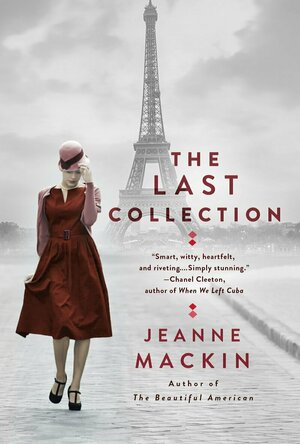
The Last Collection
Book
An American woman becomes entangled in the intense rivalry between iconic fashion designers Coco...
Historical Romance

The Art of Losing by The Anchoress
Album
AWARD-WINNING WELSH MULTI-INSTRUMENTALIST THE ANCHORESS RETURNS WITH HER CRITICALLY ACCLAIMED SECOND...
